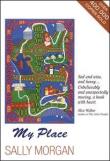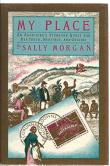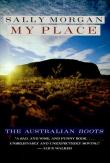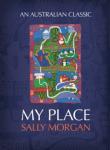AustLit
Latest Issues
AbstractHistoryArchive Description
'In 1982, Sally Morgan travelled back to her grandmother's birthplace. What started as a tentative search for information about her family, turned into an overwhelming emotional and spiritual pilgrimage. My Place is a moving account of a search for truth into which a whole family is gradually drawn, finally freeing the tongues of the author's mother and grandmother, allowing them to tell their own stories.' Source: Publisher's blurb.
Adaptations
- Sally's Story - Our Story 1995 1995 single work drama
Notes
-
Selected for the 2003 Books Alive promotion.
-
Dedication: To My Family.
-
Epigraph: How deprived we would have been / if we had been willing / to let things stay as they were. / We would have survived, / but not as a whole people. / We would never have known / our place.
Publication Details of Only Known VersionEarliest 2 Known Versions of
Other Formats
- Braille.
- Sound recording.
- Large print.
Works about this Work
-
Sally Morgan’s My Place : Reading the Australian Aboriginal Women as the Marginalised 'Other'
2023
single work
criticism
— Appears in: Marginality in Australian Literature 2023; (p. 146-160) -
Australia in Three Books : I, Memoir
2023
single work
review
— Appears in: Meanjin , December vol. 82 no. 4 2023; (p. 40-43) Meanjin Online 2023;
— Review of Blueberries 2020 selected work prose ; My Place 1987 single work autobiography 'I have a story. It will tell you something about me. You may already know me from That Thing or That Event, which I'm now using as a return to writing. That thing about me? It's sad. I will try to connect it to a broader social statement, perhaps something trite that can be laid over a nice pastel sunset for your grid, but mainly the only thing new about it is the chance to squint into another person's life before you find the next hit.' (Publication abstract) -
Staying White
2023
single work
column
— Appears in: The Monthly , August 2023; (p. 24-30) 'Jan Morris, a Welsh travel writer who knew a thing or two about identity transition, predicted in her 1992 book Sydney that mainstream Australia was about to embrace its Aboriginal heritage. Just as the convict stain had lost its stigma, the “taint” of native blood would, she anticipated, soon become cause for celebration rather than shame. Perhaps she had been influenced by the huge success of My Place, Sally Morgan’s 1987 memoir of Palyku identity, which had Australians searching their family trees in droves.' (Introduction) -
Jacob Boehme
2022
single work
column
— Appears in: The Saturday Paper , 5-11 November 2022;'Jacob Boehme is an award-winning, multidisciplinary artist who began in dance and is now a writer, puppeteer, visual theatre-maker, choreographer, producer and festival director. He wrote and performed the critically acclaimed dance work Blood on the Dance Floor and is artistic director of the Wild Dog project in South Australia. Boehme is a proud man of the Narangga people from the Yorke Peninsula and Kaurna people from Adelaide. As director of First Nations programs at Sydney’s Carriageworks, he is presenting a celebration of the 50th anniversary of the National Black Theatre, Party | Protest | Remember, on November 12.' (Introduction)
-
y
 Reckoning with the Past : Family Historiographies in Postcolonial Australian Literature
Abingdon
:
Routledge
,
2018
17218286
2018
single work
criticism
Reckoning with the Past : Family Historiographies in Postcolonial Australian Literature
Abingdon
:
Routledge
,
2018
17218286
2018
single work
criticism
'This is the first book to examine how Australian fiction writers draw on family histories to reckon with the nation's colonial past. Located at the intersection of literature, history, and sociology, it explores the relationships between family storytelling, memory, and postcolonial identity. With attention to the political potential of family histories, Reckoning with the Past argues that authors' often autobiographical works enable us to uncover, confront, and revise national mythologies. An important contribution to the emerging global conversation about multidirectional memory and the need to attend to the effects of colonisation, this book will appeal to an interdisciplinary field of scholarly readers. '
Source: Publisher's blurb.
-
[Review] My Place
1991
single work
review
— Appears in: Magpies : Talking About Books for Children , May vol. 6 no. 2 1991; (p. 31)
— Review of My Place 1987 single work autobiography -
Indigenous Voices Promoted at Fremantle Press
2008
single work
review
— Appears in: Koori Mail , 7 May no. 425 2008; (p. 47)
— Review of My Place 1987 single work autobiography ; Heartsick for Country : Stories of Love, Spirit and Creation 2008 anthology life story ; Bawoo Stories 2008 selected work picture book -
[Review] My Place
2008
single work
review
— Appears in: Fiction Focus : New Titles for Teenagers , vol. 22 no. 2 2008; (p. 45)
— Review of My Place 1987 single work autobiography -
[Review] My Place
2000
single work
review
— Appears in: Fiction Focus : New Titles for Teenagers , vol. 14 no. 1 2000; (p. 38)
— Review of My Place 1987 single work autobiography -
On the Threshold of a Renaissance - Recent Aboriginal Writing in Australia
1990
single work
review
— Appears in: Antipodes , Winter vol. 4 no. 2 1990; (p. 131-133)
— Review of Story About Feeling 1989 selected work poetry ; Wanamurraganya : The Story of Jack McPhee 1989 single work biography ; My Place 1987 single work autobiography ; Writing from the Fringe : A Study of Modern Aboriginal Literature 1990 single work criticism -
'Worth in the Telling' : Tales of Trauma in Australian Aboriginal Narratives
2001
single work
criticism
— Appears in: Canadian Children's Literature , Winter vol. 27 no. 4 (104) 2001; (p. 8-25) -
y
 Aboriginal Experience
Glebe
:
Pascal Press
,
1994
Z1019180
1994
single work
criticism
Aboriginal Experience
Glebe
:
Pascal Press
,
1994
Z1019180
1994
single work
criticism
-
form
y
 Aboriginal Experience
Martin Didsbury
,
1994
Z1019197
1994
single work
film/TV
Aboriginal Experience
Martin Didsbury
,
1994
Z1019197
1994
single work
film/TV
'The stories told by Ruby Langford Ginibi in Don't Take Your Love to Town, Sally Morgan My Place, and Mudrooroo in Wild Cat Falling provide the starting point for discussions on some of the key events and issues that have affected Aboriginal people.
Part 1: 'Aboriginal Experience' looks at the practice of removing Aboriginal children from their families, and denial of Aboriginality and equal rights. Part 2: 'Reclaiming Identity' looks at the importance of the family and the land to Aboriginal people and their quest to reclaim their identity.'
-
y
 Recovery and Restoration : Changing Identities of Aboriginal Women in Australia
1999
Z1019315
1999
single work
thesis
The thesis critically examines four autobiographical writers. These four writers, Margaret Tucker, Glenyse Ward, Sally Morgan and Ruby Langford Ginibi illustrate different ways of constructing an Aboriginal identity in their published texts.
Recovery and Restoration : Changing Identities of Aboriginal Women in Australia
1999
Z1019315
1999
single work
thesis
The thesis critically examines four autobiographical writers. These four writers, Margaret Tucker, Glenyse Ward, Sally Morgan and Ruby Langford Ginibi illustrate different ways of constructing an Aboriginal identity in their published texts.
-
Catch to $5 Cheapie For Bookbuyers
2003
single work
column
— Appears in: The Courier-Mail , 22 March 2003; (p. 7)
Awards
- 2012 shortlisted The National Year of Reading 2012 Our Story Collection — Western Australia
- 2003 shortlisted One Book One Brisbane
- 1990 inaugural winner Order of Australia Association Book Prize
- 1988 shortlisted NBC Banjo Awards — NBC Banjo Award
- 1988 winner Braille Book of the Year Award
- Suburban life
- Aboriginal Australians
- Aboriginal fringe dwellers
- Aboriginal-White relations
- Search for self identity
- Growing up
- Family history
- Mothers
- Grandmothers
- Place & identity
- Crosscultural relations
- War experiences
- Mental illness
- Stolen Generations (Australia)
- Alcoholism & alcoholics
- Landscape & identity
- Aboriginal relationship with the land
- Sexual relations
- Uncles
- Western Australia,
- Perth, Western Australia,








